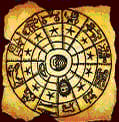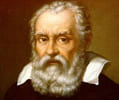Category: Astrology
Did you know that...
The gap between astrology and science has almost always been caused by the idea that the attempts for finding a material model of explanation for the astrological system of concepts, with the aid of quantitative research, have not succeeded - according to science.
The Science of Astrology
Astrology can be said to be a branch of science. It is a scientific study of the influence on human character of cosmic forces emanating from celestial bodies. The art of astrology lies in the astrologer's ability to bring an appropriate psychological, spiritual, and humanistic understanding to the knowledge of the way in which cosmic energies affect our daily lives.
The very first impulse of primitive man, was to begin blindly worshiping the biggest/dreariest thing in sight. This started with the Sun, quickly extended to the Moon, and from there it was only a matter of time before he began counting the stars. In charting the movement of the stars, the early astrologers discovered that they were useful for a lot of things. Navigation, agriculture made good use of the planetary movement studies. The ancient Mesopotamians were among the first to record an organized system of astrology.

An ancient zodiac chart
Somewhere around 1,000 B.C. the focus of astrologers shifted from individual stars and planets of interest and toward the idea of constellations, and the constellations in turn led to the first zodiac, developed by the Assyrians a few hundred years later. By the end of the 4th century B.C., the Greeks took over the astrology thing. They mapped out elaborate constellation maps, zodiac charts and the very first horoscopes.
In the second century A.D., the great Greek mathematician Ptolemy wrote the most extensive tracts to date on modern astrology. Ptolemy's work was hugely influential on what passed for science for centuries to come. It was particularly memorable for creating an incredibly compelling mathematical case that placed the earth at the centre of the universe, with the sun, moon and stars all revolving around our fine little planet.
Astrology was commonly a part of the scientific world till around the Renaissance period. History has it that the Upsala and Turku University gave tuition and practiced astrology in the 17th century.
Galileo & Astrology

The great Italian astronomer Galileo Galilei (1564-1642) is widely regarded as the father of modern physics. He is the first astronomer to both use a telescope and publicize his findings. Is less familiar is his work as an astrologer. Along with his friend and colleague Johannes Kepler, Galileo was the last of the long line of distinguished astronomer-astrologers to flourish in the courts of Europe before the two disciplines parted company in the western world in the mid seventeenth-century.
Scientists' View on Astrology
Astrology is an elaborate system of knowledge and there are voluminous treatises containing very intricate calculation bases on the position of stars and planets and the interrelation existing between them and the various phenomena on earth including human life. Because of the evidence at hand, several scientists regard this branch of knowledge with reverence, although they cannot explain its rationale.
Einstein in Astrology

Einstein has a Jupiter/Pluto/Uranus T-square in his natal chart. Pluto represents atomic energy, the bomb, and uranium. Mass conversion to energy can be expressed through this T-square geometry. Uranus represents all energies, with electricity being primary. Jupiter expands whatever it touches, thus e=mc(squared). The Saturn/Mercury conjunction in his chart tells us of his questionable mental development. Not speaking until the age of three and being temporarily diagnosed as mentally retarded when he began school, Albert was obviously misunderstood. Saturn implies delay and Mercury is about analytical ability and logical perceptions. Einstein did not seem to operate by logic particularly, but instead by intuition. Einstein was a Piscean. The ruler of his Sun, Neptune, is conjunct Chiron in Taurus. This can be read as the dissolution of matter. The atom bomb may certainly be considered from this perspective.
Celebrity astrology of Einstein
Copernicus & Astrology
Copernicus lived in an age when astronomy and astrology were inextricably connected. Astronomy was generally seen as a theoretical underpinning of astrology, problems and events in the one, having serious implications for the other. At Cracow, Copernicus learnt astrology as well as astronomy. He studied the Alfonsine Tables, read the works of Peurbach and Regiomontanus, who, inspired by ancient astronomy, sought to reform astrology.
Is Astrology a Science?
Astrology is a science for some and an art for some. In a way it relates the Sun, the Moon and the nine planets, their positions in the sky with the course of mankind on this universe. Astrologers call astrology as the "Science of the stars". But astrology has no hard and fast rules which apply to scientific terms and hence it is termed as an art or a social science. In ancient periods Astronomy and Astrology went hand in hand but gradually they began to diverge; astronomy became one of the central sciences while astrology was increasingly viewed as an occult science or superstition by natural scientists. This separation widened through the eighteenth and nineteenth centuries.
Astronomy & Astrology
Historically, most cultures have not made a clear distinction between the two disciplines, lumping them both together as one. In ancient Babylonia, famed for its astrology, there were no separate roles for the astronomer as predictor of celestial phenomena, and the astrologer as their interpreter; both functions were performed by the same person. The Greek words astrologia and astronomia were often used interchangeably. Many contemporary astrologers, however, do not claim that astrology is a science, but think of it as a form of divination Astrology and astronomy stayed together for a very long time - the funding from astrology supported major astronomical research, which was in turn used to make more and more accurate ephemerides for use in astrology. As the funding and technology progressively increased, this inexorably lead to greater and greater discoveries that eventually drove the two apart.
• Lal Kitab Science of Astrology
• Benjamin Franklin in Celebrity Astrology
Tweets by findfate